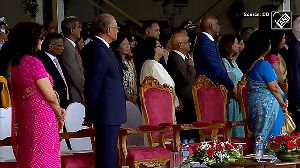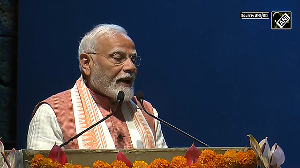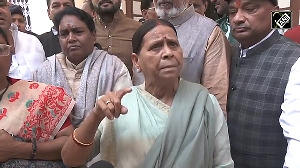The United States is strongly opposed to any attempt to legislate a ban on outsourcing to India or any other country by American companies, and will resist efforts to do so, US Trade Representative Robert Zoellick assured Union Commerce and Industry Minister Arun Jaitley on Thursday.
Jaitley who met with Zoellick for discussions on bilateral and multilateral trade issues, told mediapersons at the Indian embassy that Zoellick assured him that "the federal government of the US considers these proposals (by New Jersey some other states) as bad policy."
"I am giving you his exact words. 'The (US) federal government opposes it and is trying to resist it'," Jaitley noted.
Jaitley said that the protests against business process outsourcing and the proposed legislation by some of the state legislatures was a priority on the agenda of their talks.
"We explained the sensitivities of India's concerns that India regards it, and public and political opinion in India regards it as completely contrary to the spirit of market access and therefore such a proposal does create an adverse environment when market access negotiations in various other sectors are on," Jaitley said.
The minister, after the press conference, disclosed to a few mediapersons that Zoellick was alert to the brouhaha this issue has caused in India.
Zoellick, he said, had specifically requested that the message of the Bush Administration's strong opposition to the attempts to ban outsourcing be put out to the Indian media so that these concerns can be alleviated.
Asked how hopeful he was that the Administration would be able to persuade state legislatures not to go ahead with such a ban, Jaitley declared, "The essence of market access in services really is individuals and companies -- that people are entitled to the most efficient service at the best rate -- and if these efficient services are provided by India and some other country, we feel it will not be appropriate for legislation to impede the market forces."
"This applies in all areas where market access is granted," he said.
Jaitley expressed confidence that the US industry "which is entitled to cost competitive and quality services would watch its own interests," when asked if India was urging American companies outsourcing to India to lobby against any ban on outsourcing.
"All I can say is, the attitude of the federal government is very clear," he emphaisized.
Jaitley said that another issue he had raised in his discussions with Zoellick was India's request for a totalization agreement with the US vis-a-vis social security contributions made by Indian professionals working in the US on temporary visas such as H-1Bs.
He explained that "the (Indian) professional working here on a professional visa faces a handicap in terms of social security deductions. The duration of their visa, three plus (a extension of another) three, is six years, but they are entitled to the social security benefits only after 10 years or 40 quarters. So they make a contribution for six years but would never be able to get the advantage back."
A totalization agreement would envisage the contributions made by these professionals would be refunded "if you've not taken the benefit," he said.
He said that other issues he had taken up with Zoellick included the restoration of GSP (General System of Preferences) that covers about 842 items and also the controversy surrounding India's shrimp exports to the US.
Jaitley also made a pitch for access to the US market for Indian mango exports.
Earlier, speaking at a function hosted by the Carnegie Endowment with the cooperation of the Confederation of Indian Industry, Jaitley said that the political dialogue between India and the United States has intensified over the last two years and is now at the highest level.
However, neither India nor the US is satisfied with the volume of trade, though it is now picking up. He pointed out that over the years, India has developed an important voice for the developing world. Therefore, it is important that India and the US understand each other on the issues before the World Trade Organization, discover areas of agreement, and in areas where, if there is no agreement, how the other point of view can be accommodated.
At the WTO negotiations, said Jaitley, the Indian position will have to be accommodated. There are also certain sensitive products like clothing where an adequate amount of protection would have to be restored and a special safeguard mechanism set up.
"We don't want to stall the negotiations on agriculture," said Jaitley, "but we do hope that adequate windows of exception for economies like India's, highly dependent on agriculture, are created."
India, he pointed out, is highly competitive in electronic communications. The United States is conscious of the fact that India has gradually developed into a knowledge resource economy and, therefore, she is in a position to provide services, which are competitive and among the best so far as the global economy is concerned.






 © 2025
© 2025